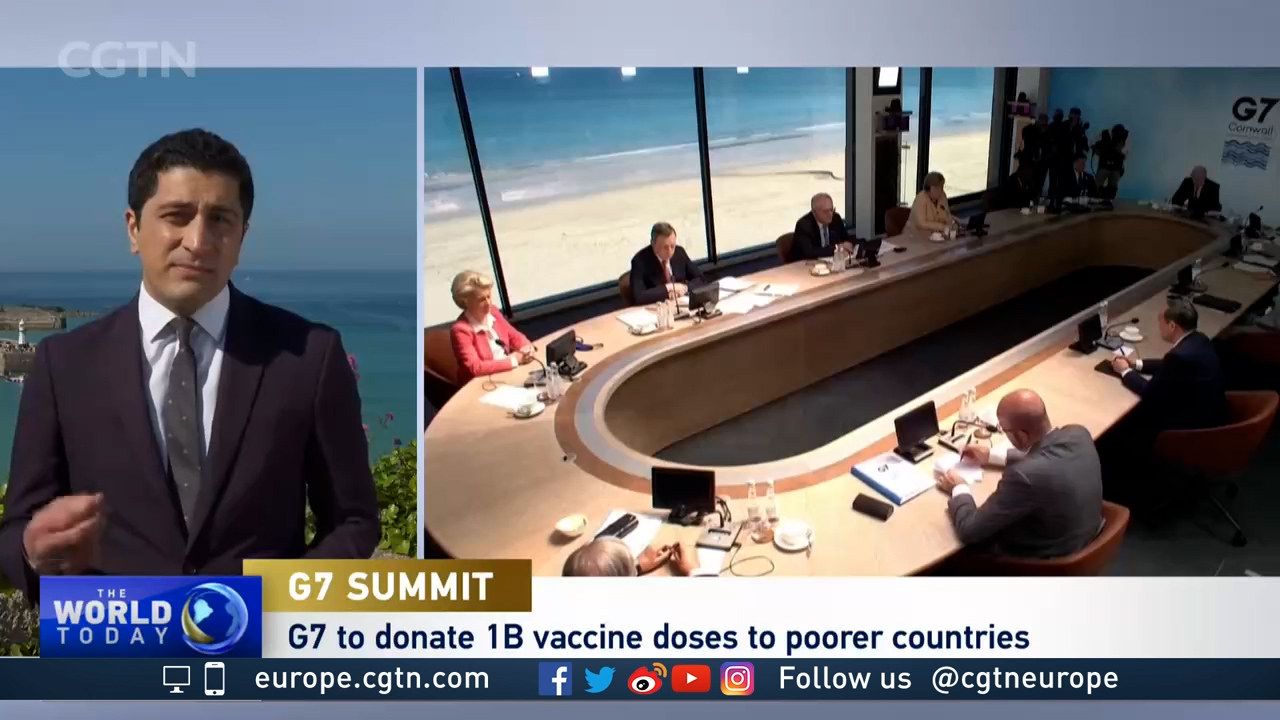05:35

The final outcome of the G7 summit has been published in the form of a "communique" or list of agreements.
The recovery plan from the COVID-19 pandemic led the agreements, as many expected, with a promise to "get... as many safe vaccines to as many people as possible, as fast as possible."
There was a pledge to donate a billion vaccine doses to poorer countries - but former UK Prime Minister Gordon Brown told Sky News the pledge, well short of the 11 billion doses campaigners say are needed to end the pandemic, was "an unforgivable moral failure."
Global economic recovery was also high on the G7 list, with a "freer, fairer trade" system suggested - along with the headline announcement earlier in the week on a new global corporate tax agreement.
On international relations, U.S. President Biden said the G7 was in a "contest" with what he termed "autocratic nations" - but not a conflict.
"As I've told President Xi Jinping myself, I'm not looking for conflict. Where we co-operate, we'll co-operate; where we disagree I'm going to state this frankly, and we are going to respond to actions that are inconsistent," he told the media.
On Saturday a spokesman for the Chinese Embassy in the UK said China backed the international system with the UN as the core and the international order based on international law, "not the so-called rules formulated by a small number of countries."
It added: "There is only one kind of multilateralism, that is, the genuine multilateralism based on the purposes and principles of the UN Charter and international law, and featuring equal treatment, cooperation and mutual benefits, not pseudo-multilateralism serving the interests of a small clique or political bloc."
G7 and the environment
The G7 also promised to "support... a green revolution," but they stopped short of bringing their target of net-zero carbon emissions forward, as many Extinction Rebellion protestors told CGTN Europe they had hoped.
Instead, the announcement said the G7 "seeks to limit the rise in global temperature to 1.5 degrees," but without the concrete proposals many hoped for.
In a press conference following the Summit, UK Prime Minister Johnson signaled the agreement was not as quick as he may have wanted.
"While it's fantastic that every one of the G7 countries has pledged to wipe out our contributions to climate change, we need to make sure we're achieving that as fast as we can and helping developing countries at the same time."

Campaigners have called for more action on climate change from the leaders. /AFP
Campaigners have called for more action on climate change from the leaders. /AFP
The final day of the G7 Summit, in Cornwall, in southwest England, focused on the climate. Extinction Rebellion held a series of protests, while the leaders pledged more money to tackle biodiversity loss.
The UK has pledged $700 million to the Blue Planet Fund to protect marine diversity. The name echoes the TV series by world-renowned naturalist David Attenborough.
The G7 also agreed to a "Nature Compact" treaty, which will hope to reverse biodiversity loss by 2030.
In 2021, about 28 percent of the 134,400 species assessed using the International Union Conversation Nature Red List criteria were listed as threatened with extinction - a total of 37,400 species compared with 16,119 threatened species in 2006.
Launching the plans, UK Prime Minister Boris Johnson said: "Protecting our planet is the most important thing we as leaders can do for our people. There is a direct relationship between reducing emissions, restoring nature, creating jobs, and ensuring long-term economic growth."
In a message to the G7, Attenborough said the coming years were some of "the most important in human history."
"The natural world today is greatly diminished. That is undeniable. Our climate is warming fast. That is beyond doubt. Our societies and nations are unequal and that sadly is plain to see. But the question science forces us to address specifically in 2021 is whether as a result of these intertwined facts we are on the verge of destabilizing the entire planet?" he asked.
"If that is so, then the decisions we make this decade - in particular the decisions made by the most economically advanced nations - are the most important in human history," Attenborough added.

